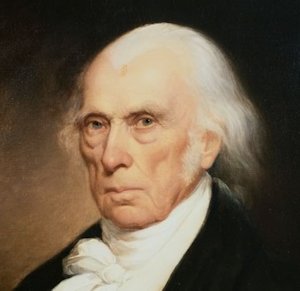Rethinking Gun Control, Part 2: The Second Amendment
 | | "Governments are afraid to trust the people with arms" -James Madison, a.k.a. the radical dude who wrote the Second Amendment |
Knowing that his rule over Great Britain was in peril, the Catholic King James II attempted to confiscate the arms of the protestants in his land by force of law. After he was subsequently overthrown in the Glorious Revolution of 1688, the new, Protestant monarchs, William and Mary, were forced to accept the English Bill of Rights of 1689, which included a provision that restored the "rights" of the English citizenry to not be disarmed without the consent of Parliament. This precendent had long-lasting ramifications for the Empire, most notably during and after the American Revolution a hundred years later. The English Bill of Rights of 1689 was a primary inspiration for the American Bill of Rights, including the Second Amendment to the United States Constitution, which reads:
A well regulated Militia, being necessary to the security of a free State, the right of the people to keep and bear Arms, shall not be infringed.
Today, the two main arguments concerning the Second Amendment are its ultimate meaning and its relevance in the modern era. Let's start with its meaning, as it seems pointless to try to discuss its relevance without fully understanding it. By modern rules of grammar, the amendment is confusing at best, but it certainly seems to imply that the "right of the people to keep and bear Arms" is dependant on a "well regulated Militia." The question becomes whether the first half of the amendment is a preconditional clause or a prefatory one, whether the "right of the people" is only applicable under "a well regulated Militia" or whether a militia is a non-exclusive example of the right "to keep and bear Arms." Unfortunately, both forms of grammatical structure are found in the writings of that time and place, meaning that one cannot use archaic rules of grammar to wholly decipher the meaning of the amendment.
Therefore, if it is possible to extract the proper meaning and intent of the amendment, we must resort to context. It is important to note that the relevant debate at the time of the Constitution's ratification--before the Bill of Rights was drafted--concerned the separation of power between the federal and state governments. The constitution permits Congress to form, organize, and regulate a standing army, and the anti-Federalists of the time were worried that an army under the control of the federal government (or foreign power) could easily and swiftly overpower a state's militia, tipping the scales of checks and balances far too much in the federal direction. Federalists countered that any armed populace would be powerful enough to form a strong militia capable of repelling an unwarranted attack by a federal army (or a foreign power). Thus, the natural compromise seemed to be that the people, as individuals, should be allowed to keep their arms so that, at a moment's notice, they could form a militia to defend themselves.
 | | Here is the only guy seriously proposing gun control legislation that would actually violate the Second Amendment, who also happens to look exactly the same as the only guy seriously arguing that all Americans have a right to own all forms of weaponry |
Indeed, this was Madison's clear intent in his first draft of the amendment: "The right of the people to keep and bear arms shall not be infringed; a well armed and well regulated militia being the best security of a free country but no person religiously scrupulous of bearing arms shall be compelled to render military service in person." For starters, in Madison's first draft, the "right of the people to keep and bear arms" is separated from the clause about a militia by a semi-colon rather than a comma. Interestingly, it would have also prohibited conscription--which would have radically altered the course of American history--but that's not terribly relevant to the current discussion, as that part was eventually separated into its own amendment, which was never ratified.
As with the English Bill of Rights of 1689, Madison's amendment was written with the clear intent of restricting government power to disarm the citizenry. A militia was considered something that could be formed either by governments or by individuals, and thus the modern argument that Madison intended for only government-run militias to be protected by the Second Amendment is simply absurd. Similarly, the distinction between a "collective" right of the people and an "individual" right doesn't jive with the Enlightenment thinking of the age, the arguments of our forefathers, or the rest of the Bill of Rights (no part of which is interpreted as applying only to "collective" rights). We may look at the grammar of the amendment and think it ambiguous, but in the late Eighteenth Century, few people--if anyone--would have interpreted it as being exclusionary against an individual's right to bear arms.
Does this mean that the individual right to firearms is absolute? Of course not. There is nothing stopping Congress from passing a law today that bans the production of firearms (except, of course, politics). The right protected by the amendment is "to keep and bear Arms," which only means that the government cannot confiscate an individual's arms for arbitrary reasons. We have a right to keep our guns under the Second Amendment, but that does not mean we have the right to own an intercontinental ballistic missile, or even a right to purchase a shotgun from the neighborhood gun store. Congress is free to regulate and control the production and sale of guns however it sees fit, and thus a proposed law to ban the production and sale of all handguns should be able to pass constitutional muster, whereas a proposed law to confiscate all handguns from the people would not.
This brings us to the question of relevancy. Gun control advocates today like to argue that the Second Amendment is outdated in a world of Predator drones, nuclear weapons, and Black Hawk helicopters. For example, Mark Harman, writing for the Charleston Daily Mail lays out a convincing case that the Second Amendment was written for a time when a federal standing army seemed unlikely (whereas we have the most ludicrously powerful army of all time under the control of the federal government today) and when easily-formed militias were the most logical way to repel an invading foreign power, something that seems all but unimaginable now. Indeed, few would argue that the citizen militias that exist in modern America are anything but products of the lunatic fringe.
 | | When the framers wrote the First Amendment, they totally intended for this to happen |
The problem with this line of thinking is assuming that intent matters when it comes to relevance. Certainly it matters when it comes to understanding the meaning of the letter of the law, as I just spent several paragraphs doing above, but when it comes time to apply a law to the modern age, the intent of the law isn't nearly as important as the applicability of the law. For example, even a Jeffersonian fanboy like myself would have a hard time believing that Jefferson intended his phrase in the Declaration of Independence that "all Men are created equal" to justify a legal decision allowing black people to have equal voting rights, and yet Civil Rights leaders have been using that very phrase for a century to argue their case.
The bottom line is that the purpose of the Second Amendment, as it is applied today, is to prevent Congress from arbitrarily confiscating the weapons of its political enemies within the people, just as the purpose of the English Bill of Rights of 1689 was to prevent another Glorious Revolution. If this is an outdated concept, then we have a system in place in which it can be repealed--it wouldn't even be the first Constitutional amendment to go through such a process--but that's a debate for the people to have, not a viewpoint to be forced upon us by the government. Personally, I do not believe the Second Amendment is outdated. While I doubt we are approaching another civil war or the invasion of a foreign power anytime soon, I do believe that any attempt to confiscate arms is a necessary precursor to inevitable tyranny, and thus, I find it hard to believe that I would ever support the repeal of the Second Amendment, unless it were simultaneously replaced by something a little less ambiguous.
-e. magill 7/2/2013
|
|